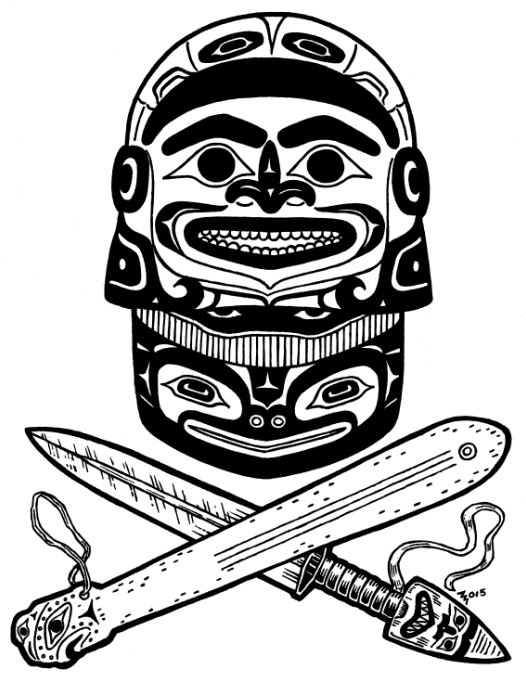Blog Archives
Tsilhqot’in move to ban non-native moose hunting
 by Monica Lamb-Yorski, Williams Lake Tribune, July 12, 2018
by Monica Lamb-Yorski, Williams Lake Tribune, July 12, 2018
The Tsilhqot’in National Government (TNG) will be attempting to ban Limited Entry Hunt (LEH) licenses for moose hunting in its territory this fall.
TNG tribal chair Chief Joe Alphonse said during an emergency meeting held Tuesday at Tl’esqox (Riske Creek), he received full endorsement from leadership to pursue a legal challenge against the LEH allocations for 2018. Read the rest of this entry
Taseko Mines halts exploration on New Prosperity in face of disputes

Fish Lake, site of the proposed New Prosperity Mine by Taseko.
by Derrick Penner, The Province, August 14, 2017
Taseko Mines has suspended plans for exploration work around its proposed New Prosperity copper-gold mine in the Cariboo Chilcotin in the face of legal disputes, a company official said. Read the rest of this entry
Tsilhqot’in enact laws to govern territory after historic court win

Chief Roger William of Xeni Gwet’in speaks at a news conference where UBCIC chiefs react to a Supreme Court Decision on the aboriginal title appeal, in Vancouver June 26, 2014.
Photograph by: Nick Procaylo , PNG.
The Vancouver Sun/Canadian Press,
WILLIAMS LAKE – A British Columbia aboriginal nation granted rights and title by Canada’s high court has introduced its own laws governing its territory and resources within the area.
The Tsilhqot’in National Government has enacted the so-called Nemiah Declaration that prevents mining and commercial logging, stops commercial road building and requires visitors to get permission before entering the land.
Tsilhqot’in land ruling was a game changer for B.C.

Chief Roger William, right, of the Xeni Gwet’in First Nation is flanked by chiefs and other officials as he pauses while speaking during a news conference in Vancouver after the Supreme Court of Canada ruled in favour of the Tsilhqot’in First Nation, granting it land title to 438,000 hectares of land. (Darryl Dyck/Canadian Press)
The Tsilhqot’in, after years of being ignored by government, now a priority for B.C.’s premier
By Duncan McCue, CBC News, Dec 23, 2014
The sun had yet to rise in British Columbia on June 26, when a group of Tsilhqot’in chiefs congregated with legal advisers to receive their copy of a long-awaited decision from the Supreme Court of Canada.
By 6:01 a.m. PT, it was clear: the highest court in the land had issued B.C. quite a wake-up call.
As First Nations leaders began expressing joy and surprise on social media, myself and other groggy reporters nursing coffees hustled to a hastily called press conference, where chiefs triumphantly proclaimed the decision a “game changer.” Read the rest of this entry
First Nations mistaken in their celebration of Supreme Court ruling
 By Ian Mulgrew, Vancouver Sun,
By Ian Mulgrew, Vancouver Sun,
“Welcome to Colonial Courtrooms,” should have been the title of the Supreme Court of Canada’s landmark aboriginal rights judgment.
While B.C. natives were busy last week celebrating the court’s affirmation of their “aboriginal title,” they should have paid closer attention to the fine print. In spite of all the hand-wringing about threats to resource development and the land mass of B.C., this is a big victory for governments. In the unanimous 8-0 decision, which dismissed with nary a nod the last half century of strident native assertions of sovereignty, the high court said B.C. natives are not unlike any other litigant squatter.
Pipeline prospects take a hit as Supreme Court grants land title to B.C. First Nation
 Aboriginal communities’ land claims have become much more viable, making future resource development iffier
Aboriginal communities’ land claims have become much more viable, making future resource development iffier
Dwight Newman, Financial Post, June 26, 2014
The Supreme Court of Canada has just released its latest take on the rules on Aboriginal title – and the first declaration of Aboriginal title in Canadian history. Its groundbreaking decision concerning the Tsilhqot’in Nation’s claims has the potential to reshape aspects of Canadian resource development more broadly. To understand why, we need to back up a bit to understand what the case has changed on Aboriginal title and why that matters.
Aboriginal title is the form of ownership Aboriginal communities hold over unceded lands that they regularly and exclusively used in the past. It is not identical to but is analogous to the fee simple title that private landowners hold, with the important difference that the courts have always considered Aboriginal title land to be collectively owned by a particular Aboriginal community. Read the rest of this entry
Tsilhqot’in granted B.C. title claim in Supreme Court ruling
Top court’s decision today resolves legal questions following 2012 B.C. Court of Appeal ruling
CBC News, June 26, 2014
The Supreme Court of Canada has granted declaration of aboriginal title to more than 1,700 square kilometres of land in British Columbia to the Tsilhqot’in First Nation, the first time the court has made such a ruling regarding aboriginal land.
The unanimous 8-0 decision released Thursday resolves many important legal questions, such as how to determine aboriginal title and whether provincial laws apply to those lands. It will apply wherever there are outstanding land claims.
The decision, written by Chief Justice Beverley McLachlin, also has implications for future economic or resource development on First Nations lands. Read the rest of this entry
Taseko mine near Fish Lake rejected by federal government
APTN National News, Feb 27, 2014
The Harper government has again rejected a proposed open-pit gold and copper mine in British Columbia that threatened to destroy a lake sacred to the Tsilhqot’in nation. Read the rest of this entry




